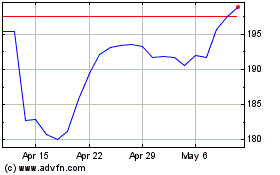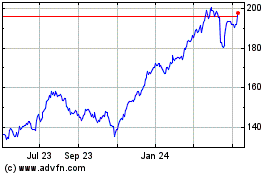JPMorgan, Citi Lobby GOP Lawmakers to Relax Swap Rules
May 23 2018 - 2:01PM
Dow Jones News
By Gabriel T. Rubin
WASHINGTON -- On the heels of a legislative victory this week
for small and midsize banks, bigger banks including JPMorgan Chase
& Co. and Citigroup Inc. are lobbying congressional Republicans
in an effort to ensure a victory of their own.
Large banks are pushing Congress to redefine swap transactions
made between different affiliates of the same company so that they
aren't subject to certain rules stemming from the 2010 Dodd-Frank
Act. The move would prevent regulators from forcing banks to post
collateral for those transactions, potentially saving banks
hundreds of millions of dollars in compliance costs.
Legislation that would legally change the definitions of those
transactions -- exempting them from Dodd-Frank collateral rules --
has passed the House, but has died in the Senate due to Democratic
opposition.
Now, House Republicans have taken a harder-line approach to push
the legislation through. In recent budget negotiations, they linked
the exemption to increased funding for the Commodity Futures
Trading Commission, the primary swaps regulator that hasn't seen a
funding increase since 2014. When some Senate Democrats objected to
the exemption, it was stripped from the budget. The CFTC ended up
having its funding cut by $1 million.
"My colleagues in the minority and particularly over in the
Senate have refused to discuss any reasonable bipartisan offers for
long-overdue policy changes unless they increase funding," said
Rep. Robert Aderholt (R., Ala.), a senior member of the House
Appropriations Committee, at a committee hearing last week.
Swaps, contracts in which two parties agree to exchange payments
based on fluctuations in interest rates or other benchmarks, were
targeted by U.S. lawmakers for greater oversight and transparency
after they played a central role in the 2008 financial crisis.
Companies use the multitrillion-dollar swaps market to hedge risks
or make bets in areas such as fuel prices or interest rates.
Last week's appropriations hearing was unusual for its frank
discussion of policy riders, the sort of sausage-making that tends
to remain behind closed doors.
"The will of the House and of this committee cannot be ignored,"
said Rep. Steve Womack (R., Ark.), a sponsor of legislation similar
to the swaps rider.
Republicans are sticking to the strategy of linking a
significant bump in the CFTC's budget to the swaps-rule exemption,
despite complaints from Trump-appointed regulators at the CFTC, who
have warned of an extended hiring freeze and possible buyouts.
JPMorgan and Citigroup have lobbied extensively on legislation
that would change the swaps definition, according to congressional
aides and lobbying disclosures, though congressional aides say it
was House Republicans who decided to pair the issue with a CFTC
budget increase to put pressure on Senate Democrats.
Representatives for JPMorgan and Citigroup declined to
comment.
The potential deal bears a striking similarity to the "swaps
pushout" deal, a policy rider attached to a 2014 spending bill that
repealed part of Dodd-Frank's swaps rules. The measure was also
linked to the CFTC's budget, and the regulator got its most recent
funding boost at that time. That rider attracted surprising popular
opposition led by Sen. Elizabeth Warren but also celebrities
including Cher, who warned in colorful language that it could lead
to another financial crisis. The deal ultimately passed, though
some liberal Democrats, including Ms. Warren, voted against it.
Regulators have been playing whack-a-mole with firms on the
issue for several years, closing loopholes that allowed banks to
transfer risk to subsidiaries that, because of location or the
nature of their business, faced less stringent regulatory
requirements.
Supporters of the legislation contend that interaffiliate swaps
don't pose the same risks as swaps between unrelated companies, and
therefore shouldn't be subject to the same rules. Major trade
groups like the U.S. Chamber of Commerce have made the case to
Congress that the primary beneficiary of such a rule change would
be derivatives end-users, like energy companies and farmers.
Write to Gabriel T. Rubin at gabriel.rubin@wsj.com
(END) Dow Jones Newswires
May 23, 2018 14:46 ET (18:46 GMT)
Copyright (c) 2018 Dow Jones & Company, Inc.
JP Morgan Chase (NYSE:JPM)
Historical Stock Chart
From Mar 2024 to Apr 2024

JP Morgan Chase (NYSE:JPM)
Historical Stock Chart
From Apr 2023 to Apr 2024
